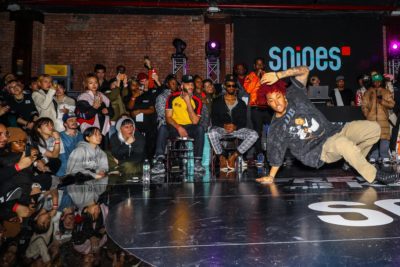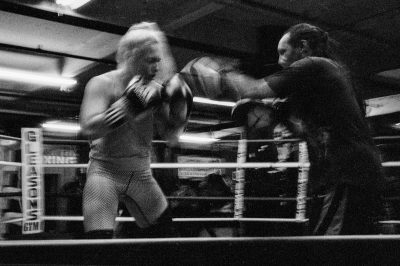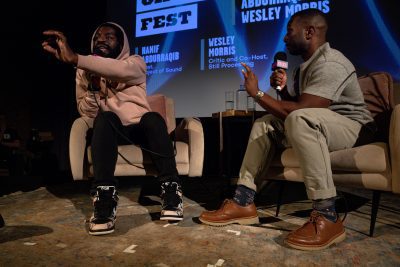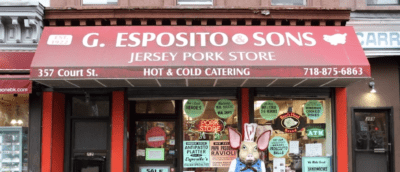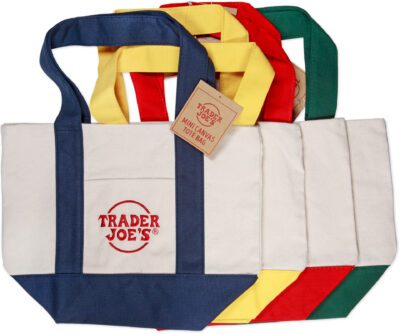I Got a Story to Tell: Jim St. Germain Survived, Against All Odds
Three months ago, a friend and I were talking about survival. We began discussing minorities who are forced into barbarous circumstances beyond their control and are expected to not only survive, but to do so in a society that neglects their well-being and doesn’t deem it necessary to provide a basic level of sustenance and support. We are both from Baltimore, and occasionally discuss issues that plague our communities and others like ours.
As we were talking, she told me that I should talk to her friend Jim St. Germain, who had written “A Stone of Hope: A Memoir,” a compelling, self-reflective memoir where he candidly shares the grueling accounts of growing up without his parents or any guidance, trying to navigate through Brooklyn’s toughest streets.
After googling him and reading a few sample pages from his book, I discovered that he was the embodiment of survival, transformation, and hope. Growing up in Haiti had not been easy for Jim. Though his family structure was fractured, resources limited, and trouble seemed to prey on Jim, he found a way to live his life challenging the system and advocating for young men who may be headed down the same destructive path as he once was.
My friend from Baltimore connected Jim and I, and I made plans to travel to Brooklyn to meet up with him. Our interview was scheduled for a Sunday afternoon, and the night before, he texted and asked if we could meet in Park Slope.
When I arrived at Sir D’s Lounge in Park Slope, Jim was sitting down reading a book with his son. We greeted each other, and he shared with me how special this place was to him, as this was the cafe where he wrote much of his book.
During our interview, Jim received a disturbing phone call. He learned that a friend of his passed away in their sleep. They were young and healthy—and just like that, they were gone. Unfortunately, Jim knows a life of pain all too well, and just as he instructed me to keep going with our interview after he received the call, he has somehow always managed to keep going no matter what.
Who is Jim St. Germain?
I am an immigrant from Haiti. I immigrated here when I was 10-years-old. I am a writer, social activist, a public speaker, policy advocate, advisor, and most importantly, a father and community leader.
What were you even expecting when you arrived to Brooklyn?
The America that I heard about and saw on TV, mostly from this movie Home Alone, was a lie. I thought that once I moved here my life would be drastically different, you know? Have like a big home, fridge full of food, and live in the suburbs.
America does a great job of portraying itself like a country without any problems to the outside world. Most people outside of the United States don’t know about the true nature of it. They don’t know that 40 million Americans are living below the poverty line.
Was it difficult to adjust?
Most definitely. Everywhere I went, a kid was trying to jump me. Violence was everywhere and just so much of it was a different type of struggle that I wasn’t used to and wasn’t expecting. How do you make sense of that as a child, especially when you come from a different country and culture, surrounded by people who speak different languages?
There were these big barriers and I had to get through them. And so I quickly realized that if I imposed fear on other people and was aggressive, that was an asset. Usually that leads you down the wrong path, which is what happened to me.
Was there a pinnacle moment that changed your course for the worse?
One day at my grandparents’ house, my dad hit me. We clashed and got into a big fight. At this point, I was a little older. NYPD was called, and my father ended up being in trouble with the law. Afterwards, my grandparents asked me to move out, and things turned from bad to worse. I ended up being in the streets fighting and hustling.
But you were still a child. Your grandparents still just put you out of their house?
Yes. They’re amazing people, but I was very challenging to deal with. So, I got kicked out and ended up being homeless. I was sleeping in abandoned houses and parking lots. Eventually, I ended up moving in with the dean of my junior high school, but I couldn’t stay with him for too long because he could have gotten in trouble.
Leaving his house pushed me deeper into the streets because now I needed to survive a bit more. So, that’s when I started to hustle more aggressively.
At this point, I’m either fourteen or fifteen years old. I was staying with friends at different places, but those places weren’t always the safest. We stayed in empty apartments all over Crown Heights. The apartments were either being renovated or were already renovated, but waiting to place tenants in them. We knew where the apartments were because we used to break into them. We would usually get caught because the superintendents would find out or the neighbors would snitch. So, that made the situation even much more challenging.

You were on your own at fourteen figuring out how to survive. Was selling drugs the easiest way to earn money?
Yes. I sold weed and hard narcotics in Crown Heights. It didn’t last long at all but for a short period of time you could find me on streets like Nostrand Ave., New York Ave., Rogers, and Montgomery. Brooklyn was survival of the fittest. Remember, where I grew up in Crown Heights was filled with concentrated poverty and violence. So, this is what I knew. This is what I was surrounded by. We were also boosting. I literally would do anything to get money just to survive.
The interesting thing is that I also had a legal job.
What jobs did you have?
Before I started hustling, I had a few jobs. Funny thing is that directly across Nostrand Ave. was an area of Crown Heights that was all Hasidic Jews, and it looked completely different from my side. It looked more like the place that I thought that I would get when I arrived in America.
I was a Shabbos goy for some of my Hasidic neighbors, where I would turn the light and stove on for Shabbat dinner. Jews were prohibited from doing certain types of work on the Sabbath.
I also used to shovel snow, worked at a supermarket and worked at a dry-cleaners when I was about thirteen. So, I was never like the lazy person. I hustled in all sorts of ways —legal and illegal, just any way to survive.
But, luckily for me, my hustling career did not last long because not too long after I started, I got pulled into the system and was charged with possession of drugs. And I say luckily because if I had been arrested at sixteen I don’t know where I would’ve ended up. I always knew that it was wrong, I always wanted better, but sometimes as a kid it’s hard to get better if you can’t see better.
Your journey in the juvenile system started at 15. Walk me through that.
I was getting arrested often, and then finally the drug charges were felonies. My home situation was pretty horrible, and everything was falling apart. I was sentenced to a year in the juvenile justice system. That year turned out to be two years because I was pretty much doing some of the same things in the system that I was doing in the streets. So, the court has an obligation to hold you until your 18th birthday if they think that you’re not buying into the program, you’re not changing, or you’re still a risk to your community.
Public safety overall was the top priority. So, the prosecutor took me back to court after the first year, and then asked the judge to give me a second, in which the judge agreed.
Did you agree to the second year?
Did I want to stay in jail? No. But, then after the second year, I actually voluntarily went to court and asked the judge to give me a third year, which is really rare. I know most people look at me with the craziest expression when I tell them, just like you are. But, at that point, I knew that the program was helping me and I wasn’t ready to be back out there. It was working and I needed more time.
Again, I had the foresight of a much older person. Here’s the thing with many young people who are living on the margin, they really want structure and safety.
Structure and rules make people feel safe, and most kids know and want that.
Exactly. Naturally, we’re going to try and push the boundaries because we’re kids. But there’s a point that we realize like, geez, I need to stay safe. That’s the same reason why we give government authority to oversee things and give us rules and regulations, because if we were making our own rules, things would be worse than they are, and that’s acknowledging that things are still fucked up.
So anyway, I realized that for the first time I had a clean and safe environment. I had consistent positive male and female role models in my life. The Canada’s— the family I lived with, allowed me to have access to these things, and not only did I need them, I appreciated them even though I fought against them at first.
At some point I realized that was going to be the thing that helped to save my life.
Do you realize that you truly made it against all odds?
Definitely, immeasurable odds.


I went back to my neighborhood, but I had a job and I went to college. I started at the Brooklyn Manhattan Community College and then I went to John Jay College, where I majored in political science. After graduation, I went back and started working in the same juvenile facility that I was a resident in.
That had to be a pretty powerful experience.
It was an eye opening experience. I realized the issues that plagued our young people went way beyond what I was able to comprehend at the time, which were really serious society issues— poverty, socioeconomic issues, law enforcement, police brutality, destruction of the family. I mean, these are very real things that I realized were causing most young people to go through the same journey I had walked, one that many of them never had the chance to make it out of.
When you came home, how different was it for you?
Another reason I extended my time in the system was because I was constantly getting news from back home about friends who were being killed, gunned down and murdered. I wrote about some of these very personal and painful situations and experiences in my book. I lost a lot of friends to the streets. When I came home, they were all gone.
From there, I just decided that this work was my life’s purpose and life’s mission. So, I became a youth advocate, and started my non-profit, Preparing Leaders of Tomorrow. Through my non-profit, I am able to work with and on behalf of youth from the same Brooklyn neighborhoods that I grew up in.
What has been your biggest lesson since working with the youth from Crown Heights, Bed-Stuy and other neighborhoods throughout Brooklyn?
Once I got heavy into the work, I realized that the issues were beyond what I was able to understand as a child. I realized that a part of the solution had to be prevention. I had to get to our kids before it was too late, before they get into the system because for many of them once they enter the system, it’s too late. It’s really sad to think of because we’re talking about thirteen, fourteen, fifteen, sixteen-year-olds, and to think that it may be too late for them at that age is heartbreaking. But, that’s the reality. You have to take into consideration all of the other factors that were a part of their lives before they got there.
Is this what led to you starting your non-profit and writing your book?
Yes, it was important for me to be at the table with power brokers, decisions makers, stakeholders and the policy makers because what I quickly realized is that we weren’t at the table, and when you’re not at the table I like to think that you’re on the menu. So, my advocacy work and sharing my story originated from my passion to change my circumstances and then, along the way I realized that there were different paths that needed to be traveled in order to get there, so that’s what my life has been about for the past ten years.
In your memoir, “A Stone of Hope: A Memoir” , you quoted DMX, “To live is to suffer, but to survive is to find meaning within the suffering.” Do you believe you choose to stay in your neighborhood to help others find meaning in their suffering?
I think so, because unfortunately if you are a black person in this country, in this world, your existence means something different than other groups of people. You’re not only living for yourself, but you’re living for your ancestors and the future. The battles we have to fight are always there, and our existence can either add value to our struggle or take away from it.
But, there’s beauty in our struggle. We are the most beautiful and resilient people on earth hence why people are so fearful of us. The level of hatred and suffering we have to go through is because people know that about us and are afraid of it. So, you know, if the struggle is going to be there you might as well use it as a catalyst for change.
My struggle gives me something to stand for and it’s given me a purpose. Take ownership of your struggle, and see it as strength and the fuel that’s going to carry you through life’s arduous journey.
Forget about my story, the need to fight for a world that is just going to be a little better than the one I had is who I am. Constantly fighting for better gets overwhelming at times, but nonetheless, it’s also the thing that wakes me up in the morning.
You might also like 

















